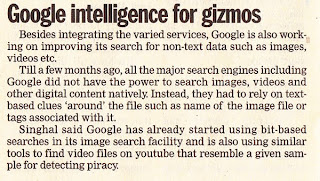Thursday, August 12, 2010
Google to bring intelligence to dumb gizmos
Amit Singhal, one of only 4 'Google Fellows' in the world, says back-end innovations will make phones and PCs more 'intelligent'. But a 'personality'? That's still a long shot
NEW DELHI: The mobile phone may soon be your best friend in need, but even Google can't give it a personality, according to Amit Singhal, the Indian in charge of keeping up Google's search experience and one of only four 'Google Fellows' in the world.
Singhal, in India for his holidays, say Google is intent on delivering the power of the Internet to the mobile phone to make it a much more 'intelligent' device.
"After a while, it could reorganise my schedule for me," he says, pointing to a Google application on his phone.
Currently, Google has many distinct services, such as maps, search, calendar, email etc., but it is the intersection of these services that can bring the next leap in the Internet experience, according to Singhal.
"We have all the components - personalised search, news, calendar, mail etc. But soon, we will integrate them in such a way that an application will be able to do much more than you can expect it to,currently," he says.
As an example, he cites an imaginary situation in which there is a power outage at a place he is supposed to go tomorrow.
"With more and more integration of all our services, my phone would be able to tell me to postpone the meeting to another day, while reminding me to pre-order an iPad for my wife's birthday," he said, explaining how an application can use the data on his calendar, mesh it with news on the power outage and iPad short-supply to come up with 'intelligent' suggestions to improve his life.
A core part of the new 'intelligence' would be built from a new service from Google which will, with the users' permission, keep collecting data about the user - where he spends his time, what clothes he orders online, what music he listens to etc.
With more and more of such data Google will 'understand' the person much more intimately, allowing Google applications to make intelligent suggestions about improving his or her quality of life. If one is, for example, a fan of rock band Metallica and the Google app sees news stories about a planned concert in its region, it would ask you if you want to book a ticket.
Currently, such 'intelligence' is put to use in guessing out the intended meaning of a word in simple web searches.
Despite all the intelligence, says Singhal, who has been working on search for two decades, no machine will ever be like a real human being. "You can never say 'I feel lousy' to your phone and expect it to understand how you feel," he said.
Besides integrating the varied services, Google is also working on improving its search for non-text data such as images, videos etc.
Till a few months ago, all the major search engines including Google did not have the power to search images, videos and other digital content natively. Instead, they had to rely on text-based clues 'around' the file such as name of the image file or tags associated with it.
Singhal said Google has already started using bit-based searches in its image search facility and is also using similar tools to find video files on YouTube that resemble a given sample for detecting piracy.
Subscribe to:
Post Comments (Atom)



No comments:
Post a Comment